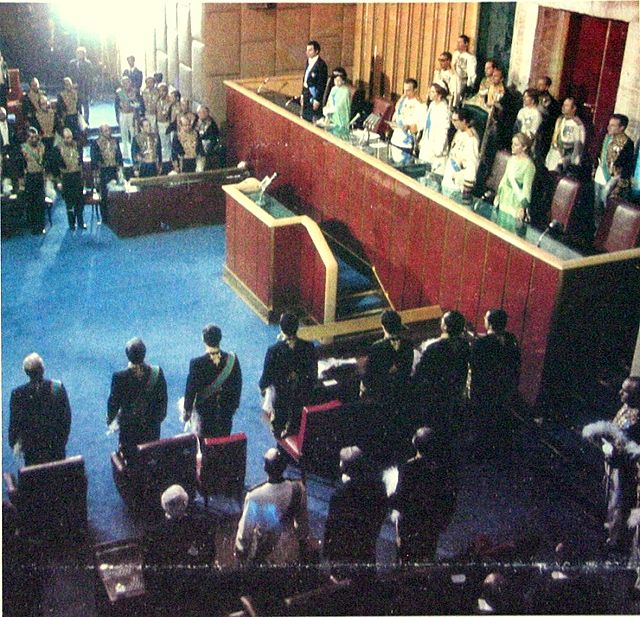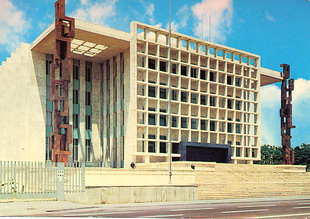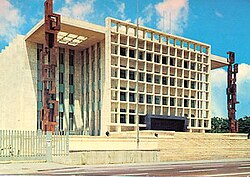Top Qs
Timeline
Chat
Perspective
Senate of Iran
Former upper house of the Iranian Parliament (1949–1979) From Wikipedia, the free encyclopedia
Remove ads
The Senate (Persian: مجلس سنا, romanized: Majles-e Senā) was the upper house legislative chamber in the Imperial State of Iran from 1949 to 1979. A bicameral legislature had been established in the 1906 Persian Constitutional Revolution but the Senate was not actually formed until after the 1949 Constituent Assembly election, as an expression of Shah Mohammad Reza Pahlavi's desire for better distribution of power. Half of the sixty seats in the senate were directly appointed by the Shah, and the other half were directly elected, fifteen represented Tehran, and the rest were elected from other regions.[2]
The Senate was disbanded after the Iranian Revolution in 1979, when the new constitution established a unicameral legislature. As of 2023[update], the former Senate building was used by the Assembly of Experts.
Remove ads
History
Summarize
Perspective
Constitution
Established as per Chapter 3, Article 45 of the Persian Constitution of 1906,
The Members of this Assembly shall be chosen from amongst the well-informed, discerning, pious and respected persons of the Realm. Thirty of them shall be nominated on the part of His Imperial Majesty (fifteen of the people of Tehran, and fifteen of the people of the Provinces), and thirty by the Nation (fifteen elected by the people of Tehran, and fifteen by the people of the Provinces).
Building
The Senate House of Iran was designed by architect Heydar Ghiaï in 1955.[3] The construction was led by Rahmat Safai, the dome being one of the most technically challenging projects in the entire endeavor.
The building is depicted on the reverse of the Iranian 100 rials banknote.[4]
- Interior Dome of Senate Chamber, Heydar Ghiaï, Architect
- Column of main Facade, Heydar Ghiaï, Architect
Members

- Mahmoud Hessaby (1951–1963).
- Ali Dashti for 1954-1979.[5]
- Jafar Sharif-Emami, Prime Minister of Iran (1960-1961 & 1978), was a member of the Iranian Senate.[6][7] He was its President[8] for a number of years.
- Jamshid Aalam (1973–1979)
List of speakers
Dissolution
During its years of activity, the Senate was once dissolved in May 1961.[9]
Following the Iranian revolution in 1979, the government became unicameral, the senate was dissolved and the new Majlis convened in the senate building.
Remove ads
Elections
Votes cast
Seats won
Remove ads
Composition
1967
As of 1967, the composition of the Senate included 48 members of the ruling New Iran Party and 11 members of the loyal opposition People's Party, while one senator was unaffiliated.[11]
| 11 | 1 | 48 |
| People's Party | Independent | New Iran Party |
1971
As of 1971, neither the New Iran Party nor the People's Party held a majority in the Senate, and had 27 and 9 members respectively. The remaining 24 senators were nonpartisan.[12]
| 9 | 24 | 27 |
| People's Party | Independent | New Iran Party |
1975
In 1975, all senator were members of the country's single-party.
| 60 |
| Resurgence Party |
Major events

- 1950 (February 9), first inaugural session presided over by Mohammad Reza Pahlavi.
- 1952, Mohammad Mosaddegh managed to obtain power to rule by decree — first, for a six-month period and then extended — due to his popularity. Later, he organized a plebiscite in 1953, won the votes, and dissolved both the Majlis and Senate.[13] Upon Mossadeq's ouster, the legislative bodies were revived.
- 1961, Mohammad Reza Pahlavi dissolved both the Majlis and Senate;[14] some time later they were restored.
- 1979 Senate approves the government of Shapour Bakhtiar.[15]
Remove ads
Bibliography
- M. Ghiai, Iran Senate House, Max Gerard Edt.Draeger Paris, 1976 ISBN 2-85119-008-3
References and notes
Wikiwand - on
Seamless Wikipedia browsing. On steroids.
Remove ads



